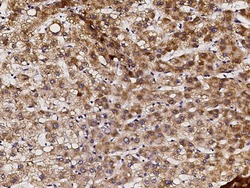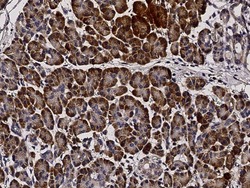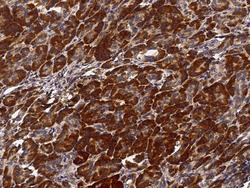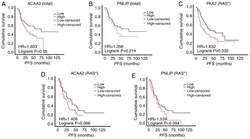Antibody data
- Antibody Data
- Antigen structure
- References [1]
- Comments [0]
- Validations
- Immunohistochemistry [3]
- Other assay [1]
Submit
Validation data
Reference
Comment
Report error
- Product number
- PA5-80956 - Provider product page

- Provider
- Invitrogen Antibodies
- Product name
- PTPMT1 Polyclonal Antibody
- Antibody type
- Polyclonal
- Antigen
- Recombinant full-length protein
- Description
- This product is preservative free. It is recommended to add sodium azide to avoid contamination (final concentration 0.05%-0.1%). This antibody has specificity for Human PTPMT1.
- Reactivity
- Human
- Host
- Rabbit
- Isotype
- IgG
- Vial size
- 100 μL
- Concentration
- 1 mg/mL
- Storage
- Store at 4°C short term. For long term storage, store at -20°C, avoiding freeze/thaw cycles.
Submitted references PAX2 promotes epithelial ovarian cancer progression involving fatty acid metabolic reprogramming.
Feng Y, Tang Y, Mao Y, Liu Y, Yao D, Yang L, Garson K, Vanderhyden BC, Wang Q
International journal of oncology 2020 Mar;56(3):697-708
International journal of oncology 2020 Mar;56(3):697-708
No comments: Submit comment
Supportive validation
- Submitted by
- Invitrogen Antibodies (provider)
- Main image

- Experimental details
- Immunohistochemical staining of human PTPMT1 in human liver with PTPMT1 Polyclonal Antibody (Product # PA5-80956, 1:1,000, formalin-fixed paraffin embedded sections).
- Submitted by
- Invitrogen Antibodies (provider)
- Main image

- Experimental details
- Immunohistochemical staining of human PTPMT1 in human pancreas with PTPMT1 Polyclonal Antibody (Product # PA5-80956, 1:1,000, formalin-fixed paraffin embedded sections).
- Submitted by
- Invitrogen Antibodies (provider)
- Main image

- Experimental details
- Immunohistochemical staining of human PTPMT1 in human pancreatic carcinoma with PTPMT1 Polyclonal Antibody (Product # PA5-80956, 1:1,000, formalin-fixed paraffin embedded sections).
Supportive validation
- Submitted by
- Invitrogen Antibodies (provider)
- Main image

- Experimental details
- Figure 5 ACAA2 overexpression is associated with a poor prognosis of patients with ovarian cancer. (A and B) Kaplan-Meier progression-free survival curves for patients with a low or high expression of (A) ACAA2 or (B) PNLIP among the total number of patients; (C-E) Kaplan-Meier progression-free survival curves for patients with (C) a negative PAX2 expression (PAX2 - ) or positive PAX2 expression (PAX2 + ), (D) low or high ACAA2 expression or (E) low or high PNLIP in expression RAS positive (RAS + ) subgroup.
 Explore
Explore Validate
Validate Learn
Learn Western blot
Western blot Immunohistochemistry
Immunohistochemistry